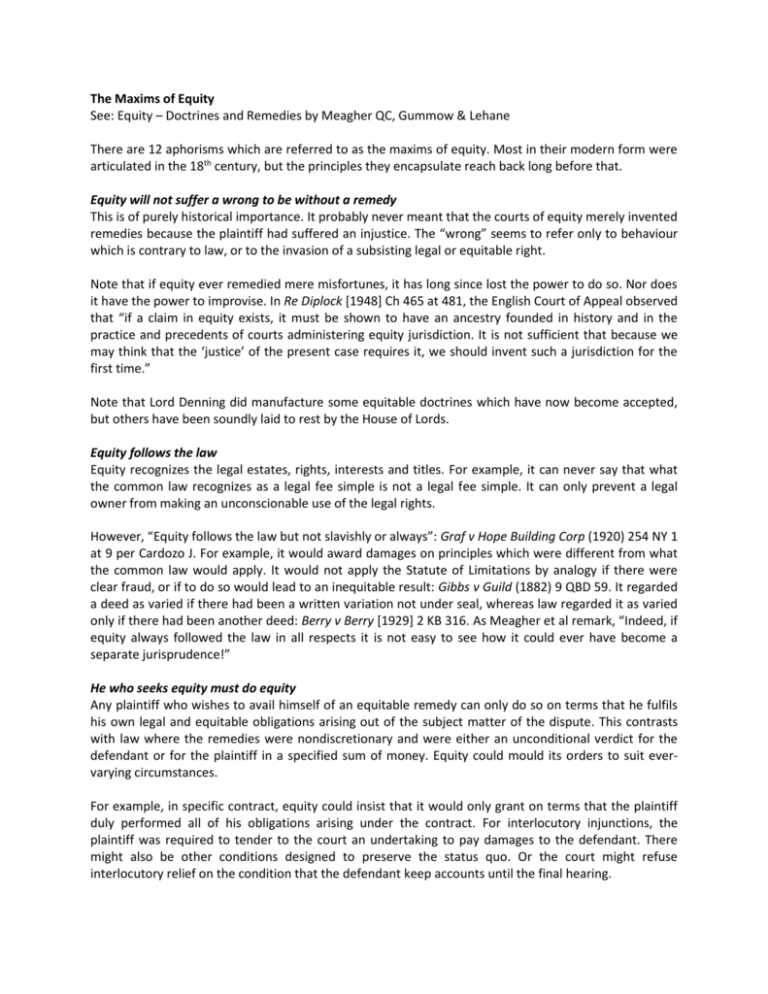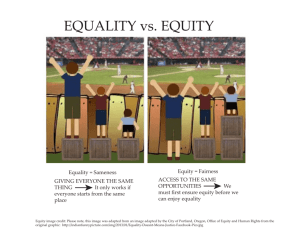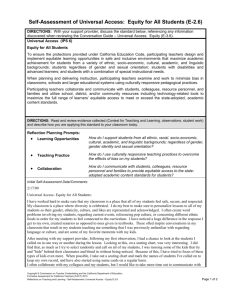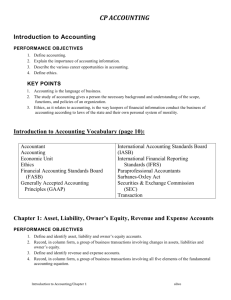The Maxims of Equity See: Equity – Doctrines and Remedies by
advertisement

The Maxims of Equity See: Equity – Doctrines and Remedies by Meagher QC, Gummow & Lehane There are 12 aphorisms which are referred to as the maxims of equity. Most in their modern form were articulated in the 18th century, but the principles they encapsulate reach back long before that. Equity will not suffer a wrong to be without a remedy This is of purely historical importance. It probably never meant that the courts of equity merely invented remedies because the plaintiff had suffered an injustice. The “wrong” seems to refer only to behaviour which is contrary to law, or to the invasion of a subsisting legal or equitable right. Note that if equity ever remedied mere misfortunes, it has long since lost the power to do so. Nor does it have the power to improvise. In Re Diplock [1948] Ch 465 at 481, the English Court of Appeal observed that “if a claim in equity exists, it must be shown to have an ancestry founded in history and in the practice and precedents of courts administering equity jurisdiction. It is not sufficient that because we may think that the ‘justice’ of the present case requires it, we should invent such a jurisdiction for the first time.” Note that Lord Denning did manufacture some equitable doctrines which have now become accepted, but others have been soundly laid to rest by the House of Lords. Equity follows the law Equity recognizes the legal estates, rights, interests and titles. For example, it can never say that what the common law recognizes as a legal fee simple is not a legal fee simple. It can only prevent a legal owner from making an unconscionable use of the legal rights. However, “Equity follows the law but not slavishly or always”: Graf v Hope Building Corp (1920) 254 NY 1 at 9 per Cardozo J. For example, it would award damages on principles which were different from what the common law would apply. It would not apply the Statute of Limitations by analogy if there were clear fraud, or if to do so would lead to an inequitable result: Gibbs v Guild (1882) 9 QBD 59. It regarded a deed as varied if there had been a written variation not under seal, whereas law regarded it as varied only if there had been another deed: Berry v Berry [1929] 2 KB 316. As Meagher et al remark, “Indeed, if equity always followed the law in all respects it is not easy to see how it could ever have become a separate jurisprudence!” He who seeks equity must do equity Any plaintiff who wishes to avail himself of an equitable remedy can only do so on terms that he fulfils his own legal and equitable obligations arising out of the subject matter of the dispute. This contrasts with law where the remedies were nondiscretionary and were either an unconditional verdict for the defendant or for the plaintiff in a specified sum of money. Equity could mould its orders to suit evervarying circumstances. For example, in specific contract, equity could insist that it would only grant on terms that the plaintiff duly performed all of his obligations arising under the contract. For interlocutory injunctions, the plaintiff was required to tender to the court an undertaking to pay damages to the defendant. There might also be other conditions designed to preserve the status quo. Or the court might refuse interlocutory relief on the condition that the defendant keep accounts until the final hearing. Before married women were entitled to a separate estate, where a husband plaintiff sought to recover property from his wife, he had to make a suitable settlement for her. Where the plaintiff sought to recover land from the defendant, where, to the knowledge of the plaintiff, the defendant had spent money on it believing it to be his, the plaintiff could only recover if he offered to reimburse the defendant. [If he did not know about the expenditure, however, he did not have to repay: Brand v Chris Building Co [1957] VR 625. The maxim requires the plaintiff to do equity, not justice.] In trusts, a beneficiary cannot recover trust property unless he is prepared to defray the trustee’s legitimate expenses. The doctrine of election: (a rather strange doctrine). Imagine a testator left a sum of money, $1,000,000 to B1, and the property Blackacre to B2. But in fact, B1 is the true owner of Blackacre! (Perhaps the testator was only a joint tenant along with B1 and did not know that Blackacre would not fall into his estate). B1 cannot decide that he will simply accept the million leaving B2 out in the cold. If he wants the gift in the will, he must treat B2 fairly, either giving him Blackacre or compensating him for Blackacre out of his inheritance. In mortgages, a mortgagor must redeem all the principal and interest claimed before he can sue to redeem his mortgage or prevent sale or foreclosure. This rule is applied almost inflexibly. If he is unable to repay, he is almost invariably denied equitable relief. In specific performance, the concept of readiness and willingness to complete may be seen as an application of the doctrine. Finally, in the case of illegal loans: imagine that P has given some jewellery to a bookie as security for a loan. Under an illegal loan, the bookie has lent him the money at an exorbitant interest rate. P has not paid back the bookie his money, but takes him to Court to sue for the return of his jewellery. The Court will not simply compel the bookie to return it. P must pay the capital amount borrowed in addition to reasonable interest. It would not be fair for him to walk away with the jewellery and the money too. He who comes to equity must come with clean hands Where a plaintiff whose conduct has been improper in a transaction seeks relief in equity such relief will be refused. It is important to note that “improper” is meant legal and not moral impropriety. However, impropriety is not illegality. The defence of illegality is different from the defence of clean hands, and where the former exists, there is no need to rely on the later. In Cory v Gertcken (1816) 2 Madd 40; 50 ER 250 and Overton v Banister (1884) 3 Hare 503; 67 ER 479, the infant plaintiffs induced their trustees to release trust funds to them by representing that they were of full age. They then sued the trustees for having improperly advanced the money! The Court treated them as adults who had instigated the breach of trust, depriving them of their protection of infancy. A plaintiff will not be entitled to a decree of specific performance if the contract he was seeking to enforce was procured by his own misrepresentation (fraudulent or innocent). For the defence of unclean hands to operate, the impropriety must have an immediate and necessary relation to the equity sued for. In Dering v Earl of Winchelsea (1787), Dering and the Earl and Rouse were all sureties for a bond belonging to X, Dering’s brother. When X defaulted, Dering had to pay all. He sought to recover from the other two. (The doctrine of contribution of sureties is not founded in contract, but is the result of general equity on the ground of equality of burden and benefit.) The other two sureties said that Dering had led X astray, encouraging him to gamble, etc. The Court said that “clean hands” did not mean a general depravity, but must be used in a legal or moral sense. X was the author of his own loss, not Dering, and Dering could recover. In Coatsworth v Johnson (1886), the Plaintiff went into possession of a farm under an agreement for a 21 year lease. He did not pay any rent. The Defendant ousted him from possession on the basis that he was no more than a tenant at will. The Plaintiff sued the Defendant in trespass, claiming to be entitled to a 21 year term in equity. That depended on whether he was entitled to specific performance of the agreement. The Court held that he was not because he had breached a covenant in the lease to cultivate the farm, i.e., he did not have clean hands. Note that this maxim has limits. It will not apply in cases of hardship, or in cases where the Court finds that a Tinsley v Milligan situation or Tribe v Tribe situation applies. In Tinsley, the Court applied a common law rule, the Rule in Bowmakers that a person could keep title to an equitable estate if they did not have to rely on illegality in order to prove that title. In Tribe, the Court allowed a person to assert an equitable title because he had never actually committed the fraud.








